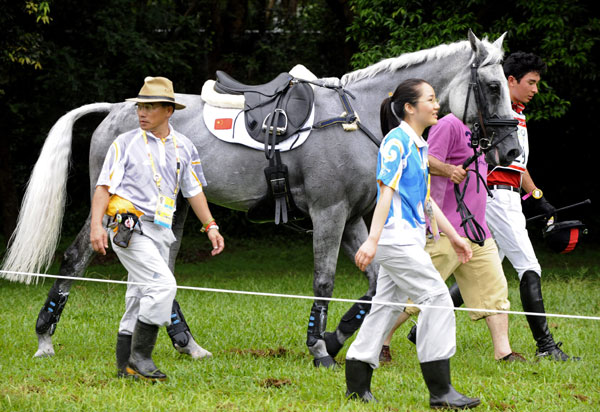Rough ride
Updated: 2012-04-15 09:26
By Tang Zhe (China Daily)
|
||||||||
China still has a lot of caching up to do in equestrian, but it's moving in the right direction, Tang Zhe reports.
The riders are still too unseasoned, the horses still not up to par.
But it's getting better.
China didn't delve into Olympic equestrian events until the 2008 Games in Beijing. There's still a lot of catching up to do.
 |
|
China's Alex Hua Tian walks beside his horse Chico after falling when the horse encountered trouble at one of the 39 jumps at the Beas River cross-country course near Hong Kong during the 2008 Olympic Games. [Photo/Agencies] |
Alex Hua Tian, the only Chinese rider to qualify for the London Olympics so far, has been training in England since he moved there with his family at the age of 11. The 22-year-old, whose horse fell at the Beijing Games, is coached by former world champion Clayton Fredericks and his wife, Lucinda Fredericks, in Wiltshire.
Another promising rider, Zhu Meimei, is also training and competing in Europe under renowned German rider Ludger Beerbaum. The 20-year-old American-born rider changed her nationality to represent China in 2006 and is expected to be ready for the 2016 Olympics.
To have more talented riders and develop the sport in the long run will require the authority to build up the grassroots foundation across the country, four-time Olympic champion Beerbaum told China Daily.
"In the mid-term and long term, it is very important to bring the sport to almost everybody, then you can create some talents," said Beerbaum, who won one individual gold and three team titles at four Olympics from 1988 to 2000.
Two big things are lacking.
"Equestrian is not a traditional sport in China, it's kind of new," Beerbaum said. "In Europe, we have a tradition of a couple hundred years to get going with breeding, and because of the military, everybody was a little bit into horses. But this history is not here, which is the first obstacle.
"The second is you have to build up breeding, which means opening the borders and having trade between Europe and China. The whole industry need to be developed yet.
"The Europeans are very strict in vaccinating the horses and have passports for every single individual horse, and in the passport it is mentioned what you vaccinate is not in the food chain.
"The authorities in Europe are pretty much working on this issue and they would like to have the same system get going here in China, but for the moment, they are starting slowly in this process and it's not on the same level."
Though China is seeking more participation by hosting a growing number of equestrian tournaments that have attracted some famous international riders, the competitions' level is constrained by the vaccination issue. Riders must compete with unfamiliar horses from China instead of their own.
The 2010 Guangzhou Asian Games was the first time the Chinese mainland held an international equestrian tournament. Eighty foreign horses were quarantined and sent back abroad. (Equestrian was held in Hong Kong for the 2008 Games).
A similar solution is expected to be put to use.
"In the meantime, (Chinese and European authorities) are now discussing that there could be a solution, saying the horses coming from Europe to Beijing will be get unloaded at the airport, sealed in the lorry, and then driven to a venue, during which process it must be confirmed that they have no contact with other farms," Beerbaum said.
"Maybe this will be the solution for two or three years until the vaccination and passport issue is solved."
Beerbaum will compete in the 2012 Longines Beijing Masters to be hled in the Bird's Nest from May 10 to 12.
The high cost of owning a horse also impedes the sport's popularization, as only the rich can afford to breed them.
"To bring up a horse is quite expensive, which is also a question we face more and more in Europe," Beerbaum said. "I think in the future it is very crucial to start and develop breeding horses in self-owned farms around the country, because it is cheaper than in big riding clubs. Then you will get a lot of people to know horses, to start riding, not just competing at big shows.
"Then the club owners can see the talents in the country, maybe for every 100 you will have ten talents, and ask them to ride their more valuable horse in big clubs , and come to the sport, this is something that is needed to be established."
"For sure this won't be done in one year. Maybe it will take five to 10 years, but I already see the potential here, it's very positive."

 'Taken 2' grabs movie box office crown
'Taken 2' grabs movie box office crown
 Rihanna's 'Diamonds' tops UK pop chart
Rihanna's 'Diamonds' tops UK pop chart
 Fans get look at vintage Rolling Stones
Fans get look at vintage Rolling Stones
 Celebrities attend Power of Women event
Celebrities attend Power of Women event
 Ang Lee breaks 'every rule' to make unlikely new Life of Pi film
Ang Lee breaks 'every rule' to make unlikely new Life of Pi film
 Rihanna almost thrown out of nightclub
Rihanna almost thrown out of nightclub
 'Dark Knight' wins weekend box office
'Dark Knight' wins weekend box office
 'Total Recall' stars gather in Beverly Hills
'Total Recall' stars gather in Beverly Hills
Most Viewed
Editor's Picks

|

|

|

|

|

|
Today's Top News
Health new priority for quake zone
Xi meets US top military officer
Japan's boats driven out of Diaoyu
China mulls online shopping legislation
Bird flu death toll rises to 22
Putin appoints new ambassador to China
Japanese ships blocked from Diaoyu Islands
Inspired by Guan, more Chinese pick up golf
US Weekly

|

|







